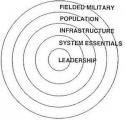
Originally Posted by
SWJED
A large part of my day job involves all aspects of the Joint Urban Warrior program. A "take-away" from the JUW 05 War Game evolved from discussions and centered on a lack of common language or understanding of operational terms among the Services and multinational partners. This is exacerbated by the absence of many relevant terms in Joint Publication 1-02, and a common PME program amongst the Services.
To quote one participant:
We continue to struggle with creating a common language that all can understand in its relevant operational context. Multinational coalitions encounter problems with different terms or conflicting usage of similar terms. This problem is often exacerbated by inadequate pre-war planning, and by translating from one language to another. As examples, participants (JUW 05) struggled to delineate among Irregular Warfare, Asymmetric Warfare, Stability Operations, Stability and Support Operations, Other Expeditionary Operations, Low-Intensity Conflict, and Military Operations Other than War (MOOTW).
This particpant's recommendation was:
Since all will agree “words have meanings,” it is essential that Joint Publication 1-02 be revised to incorporate the following terms: Defeat, Irregular Warfare, Combined Operating Area, Critical Vulnerability, Critical Requirement, Rule of Law, Legitimacy, Credibility, Asymmetric Warfare, Influence Operations, Pattern Analysis, and Stability and Support Operations in order to remove operational and planning friction and allow Joint Force Commanders to more easily convey their intent to subordinate commanders/leaders.
The bottom line is we need to be on the same sheet of paper when it comes to operational terms and the best place to start is JP 1-02.
Originally Posted by SWJED








Bookmarks